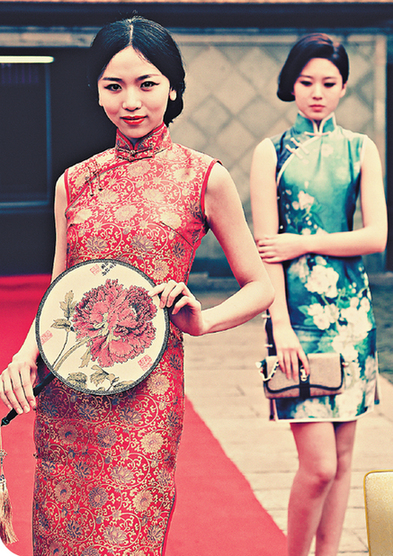A silk businessman's dream to bring ancient brocade to life
 0 Comment(s)
0 Comment(s) Print
Print E-mail Xinhua, January 20, 2015
E-mail Xinhua, January 20, 2015
There are days when silk trader Wu Jinhua barely has time to stop for a glass of water.
 |
|
Models show cheongsams made of Songjin silk. [File photo] |
His company, Wujiang Dingsheng Silk Co.,Ltd., became part of a fashion phenomenon during the 2014 APEC conference in Beijing after prominent world leaders were spotted wearing a modern take on Chinese garb made out of his company's Songjin silk.
Since then, he has become one of the busiest occupants in his ancient hometown of Shengze.
"Sometimes, I even don't have time to enjoy a glass of drinking water," he says.
Wu, constantly engaged on two mobile phones which rarely stop ringing, says he's been overwhelmed with orders for the high-collared Chinese tunics plainly described as "APEC leader suits".
A strong influence on his success is the fact his company is one of the few mass producers of traditional Songjin silk.
With a history dating back to the Song Dynasty (960-1279), the textile, also known as Song brocade, was used by royal family members to make clothes or for framing calligraphy.
The practice, however, almost became extinguished three years ago after harsh competition from more modern chemically produced textiles plummeted demand for the complicated, dated production methods of Songjin silk.
Further stinting the industry, aging craftsman have had difficulty recruiting apprentices to take part in the UNESCO-heritage-listed silk making procedure, as most young adults make more money in chemical fiber companies.
In Wu's hometown of Shengze, about an hour drive from Shanghai, there are about 2,500 factories. Among them, only 10 can manufacture silk textile, among the silk producers, only Wu's factory is able to manufacture Songjin.
Wu has been passionate about silk production from childhood. He says seeing the old Songjin looms retreat into local museums brings him feelings of great sadness.
He began reviving the ancient textile in 2012 after his factory produced a small hand-made Songjin hand bag which turned out to be a popular exhibit at a local showcase.
Seeing its popularity, he was encouraged to organize a research team to work out a way that would lead to mass production of the textile.
The team succeeded in making technical improvements on four pieces of heavy machinery imported from Europe, enabling Wu's factory to mechanize the process.
Soon, they were producing 100 meters of Songjin a day, compared with the 8 centimeters accomplished by craftsman, Wu says.
With access to virtually unlimited amounts of the fabric, his factory could experiment with bold fashion designs without worrying about wasting the precious material.
His design team, which includes two Italian artists, is branded under the name Saint-Joy, which also makes scarves and handbags.
While utilizing machine manufacturing, Wu, 48, has also used his resources to prop up high-end Songjin products made by craftsmen.
He employs 63-year-old Hu Deyin, a renowned silk craftsman, to work for him.
Every week day, Hu sits at the end of a wooden loom roughly the size of a large piano, weaving the silk as if he were composing a classical masterpiece. The loom is almost identical to those used by craftsman almost a thousand years ago.
Shrewd as he is, Wu has opened several boutique shops in Beijing and Suzhou. Though, currently, Wu's clients are mostly domestic, his ambitions are beyond China.
Recently, with the help of a Chinese friend, Wu has opened his first overseas office in London. The office will be a base to sell Songjin products to European customers.
"I plan to open a boutique shop in Paris to help Europeans recognize modern Chinese silk products," Wu said.






Go to Forum >>0 Comment(s)